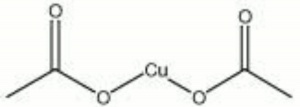Difference between revisions of "Copper acetate"
Jump to navigation
Jump to search
| (2 intermediate revisions by 2 users not shown) | |||
| Line 1: | Line 1: | ||
== Description == | == Description == | ||
| − | A dark green crystalline powder. Copper acetate is prepared by the reaction of [[acetic acid]] with [[copper oxide red|copper oxide]]. The green is unstable and can leave a black residue upon decomposition. Copper acetate is also used as a [[pesticide]], [[fungicide]], [[catalyst]], textile [[ | + | A dark green crystalline powder. Copper acetate is prepared by the reaction of [[acetic acid]] with [[copper oxide red|copper oxide]]. The green is unstable and can leave a black residue upon decomposition. Copper acetate is also used as a [[pesticide]], [[fungicide]], [[catalyst]], textile [[dye]] and as a [[pigment]] for paints, [[ink|inks]], and [[ceramic|ceramics]]. |
See also [[copper acetate, basic]]. | See also [[copper acetate, basic]]. | ||
| + | [[[SliderGallery rightalign|copper acetate.jpg~Chemical structure]]] | ||
| + | == Synonyms and Related Terms == | ||
| − | + | copper (II) acetate; cupric acetate; cupric diacetate; crystals of Venus, crystallized verdigris; verdet | |
| − | + | == Risks == | |
| − | [ | + | * Toxic by ingestion. |
| + | * Contact causes irritation and burns. | ||
| + | * ThermoFisher: [https://www.fishersci.com/store/msds?partNumber=AC405370500&productDescription=COPPER%28II%29+ACETATE%2C+ANHY+50GR&vendorId=VN00032119&countryCode=US&language=en SDS] | ||
| − | == | + | ==Physical and Chemical Properties== |
Soluble in water, ethanol. Slightly soluble in ether, glycerol. | Soluble in water, ethanol. Slightly soluble in ether, glycerol. | ||
| Line 24: | Line 28: | ||
|- | |- | ||
! scope="row"| Melting Point | ! scope="row"| Melting Point | ||
| − | | 115 | + | | 115 C |
|- | |- | ||
! scope="row"| Density | ! scope="row"| Density | ||
| − | | 1.882 | + | | 1.882 g/ml |
|- | |- | ||
! scope="row"| Molecular Weight | ! scope="row"| Molecular Weight | ||
| Line 33: | Line 37: | ||
|- | |- | ||
! scope="row"| Boiling Point | ! scope="row"| Boiling Point | ||
| − | | 240 (dec) | + | | 240 C (dec) |
|} | |} | ||
| − | == | + | ==Resources and Citations== |
| − | |||
| − | |||
| − | |||
| − | |||
| − | |||
| − | |||
* G.S.Brady, ''Materials Handbook'', McGraw-Hill Book Co., New York, 1971 Comment: p.231 | * G.S.Brady, ''Materials Handbook'', McGraw-Hill Book Co., New York, 1971 Comment: p.231 | ||
Latest revision as of 12:38, 4 July 2022
Description
A dark green crystalline powder. Copper acetate is prepared by the reaction of Acetic acid with copper oxide. The green is unstable and can leave a black residue upon decomposition. Copper acetate is also used as a Pesticide, Fungicide, Catalyst, textile Dye and as a Pigment for paints, inks, and ceramics.
See also Copper acetate, basic.
Synonyms and Related Terms
copper (II) acetate; cupric acetate; cupric diacetate; crystals of Venus, crystallized verdigris; verdet
Risks
- Toxic by ingestion.
- Contact causes irritation and burns.
- ThermoFisher: SDS
Physical and Chemical Properties
Soluble in water, ethanol. Slightly soluble in ether, glycerol.
| Composition | Cu(C2H3O2)2-H2O |
|---|---|
| CAS | 142-71-2 |
| Melting Point | 115 C |
| Density | 1.882 g/ml |
| Molecular Weight | mol. wt. = 181.64 |
| Boiling Point | 240 C (dec) |
Resources and Citations
- G.S.Brady, Materials Handbook, McGraw-Hill Book Co., New York, 1971 Comment: p.231
- Ralph Mayer, A Dictionary of Art Terms and Techniques, Harper and Row Publishers, New York, 1969 (also 1945 printing)
- Richard S. Lewis, Hawley's Condensed Chemical Dictionary, Van Nostrand Reinhold, New York, 10th ed., 1993
- The Merck Index, Martha Windholz (ed.), Merck Research Labs, Rahway NJ, 10th edition, 1983 Comment: entry 2690
